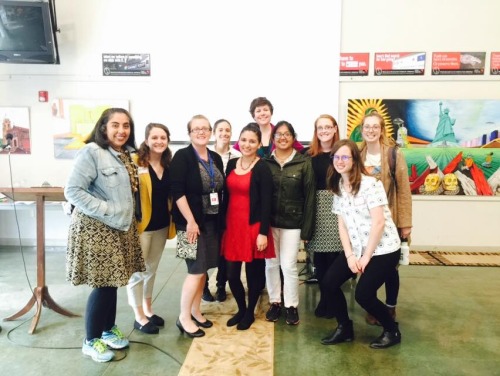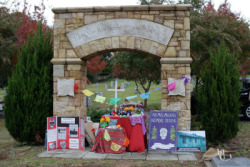The winter holidays are the biggest shopping period of the year in the United States. In 2013, Americans spent over $600 billion on gifts, food, decorations, and other holiday purchases. But do you know how your purchasing choices impact the workers that harvest your food and greenery? Check out these ideas to learn more about how to support fair labor practices this holiday season.
Give the gift of financial support to a farmworker family in need. Consider donating to the Farmworker Emergency Fund through our partner organization NC FIELD as a way to directly support farmworkers in crisis. NC FIELD works with farmworker youth and families around Kinston, N.C., to promote education, leadership, and dignity. Their programs include the Poder Juvenil Campesino (Rural Youth Power) youth program, public awareness campaigns, housing and educational programs, a farmworker food bank, and the emergency fund.
The NC FIELD Farmworker Emergency Fund was established in Fall 2013 to assist farmworkers in crisis. Whether farmworkers need a motel room because their labor camp is unsafe or basic necessities for their family when they haven’t been paid, this fund is designed to help farmworkers manage immediate emergencies. This fund does not supplant available entities such as the free clinic or food bank; rather, it provides basic stability in order for farmworkers to have the time and funds to take advantage of the existing resource network.
Farmworkers or social workers and providers working on their behalf may request an application from the financial officer, Pedro Sanchez, if they are working or living within a 40-mile area around Kinston. The application must be read and applied for by at least half of the voting members of the NC FIELD board.
In the past year, the NC FIELD Farmworker Emergency Fund has been used to help pay for transportation of a young disabled farmworker living in a work camp trying to return to his family in Florida, for utility bills of several farmworker families during last year's particularly cold weather, and for hospital costs incurred by a farmworker youth with health problems most likely associated with dehydration and pesticide exposure in the fields. Donate to the Farmworker Emergency Fund here.
Make informed choices about your holiday decorations. If you celebrate Christmas, do you know where your tree comes from? In North Carolina, 5 to 6 million Christmas trees are harvested each year, bringing about $100 million to the state’s economy. Growing and harvesting Christmas trees requires a lot of work. The years-long process includes planting and shaping trees, cutting them down, packaging them and loading them into trucks for delivery. By the time they are ready for harvest, trees often weigh over 100 pounds. Migrant workers, many of whom come through the temporary H-2A visa program, do much of this grueling work. Check out a WUNC radio story here to learn more about the process. Various pesticides are often applied to Christmas trees throughout their growing cycle, placing workers at risk of exposure to dangerous chemicals. How can you support farmworker health and well-being while shopping for a tree and greenery?
● Consider purchasing a tree or wreath that was grown sustainably. Buying an organic or low-spray tree or wreath is one way to support tree farms that do not expose farmworkers to dangerous pesticides. Toxic Free NC publishes a guide to North Carolina Christmas tree farms that use organic practices (last updated 2013).
● Learn more about where your tree came from. Take the time to do some research on the living and working conditions of workers at Christmas tree farms that sell trees in your area.
● Choose an alternative Christmas tree. There are many creative ways to make a festive and sustainable “tree” from things already in the home! For some ideas, start here and here.
● Recycle your tree. After the holiday, trees can be reused for mulch and many other purposes. Make sure to remove all decorations from your tree before recycling it. This article offers information about tree recycling services in the Triangle area (from 2013; call for 2014 information).
Buy fair trade gifts. Purchasing a fair trade product ensures that the workers, farmers, or artisans who created the item are being paid a just price for their work. Fair trade standards require fair pricing, fair working conditions, and sustainable farming practices that are free of dangerous chemicals. Fair Trade USA publishes a fair trade holiday gift guide.
Prioritize worker rights and dignity in your holiday grocery shopping. Support farmworkers by buying from companies that have engaged in collective bargaining agreements with workers. Or, opt to purchase locally grown and/or pesticide-free produce that honors fair labor practices. SAF offers a buyers’ guide to supporting farmworkers as a consumer.
Learn about and support current farmworker-led campaigns and boycotts.
● Support the Farm Labor Organizing Committee (FLOC) in their organizing campaign calling on R.J. Reynolds Tobacco Company to sign an agreement with North Carolina farmworkers guaranteeing freedom of association and collective bargaining for fair wages and working conditions.
● The Coalition of Immokalee Workers is calling on Publix, Wendy’s, and Kroger to join their Fair Food Program to end the exploitation of Florida tomato workers. Learn more and take action here, and sign their holiday card asking these companies to treat their workers with dignity.
● Learn about the United Farm Workers’ current campaigns, including signing their holiday pledge to support dairy workers calling for better treatment at the Darigold cooperative.
This holiday season, pledge to be an educated consumer and show support for the families whose hard work puts food on our tables and holiday greenery in our homes. Together, we can use our purchasing power to call for dignity and justice for farmworkers in our country and our communities.
 Friday, April 24, 2015 at 11:17AM by
Friday, April 24, 2015 at 11:17AM by  Jennie Belle
Jennie Belle 










